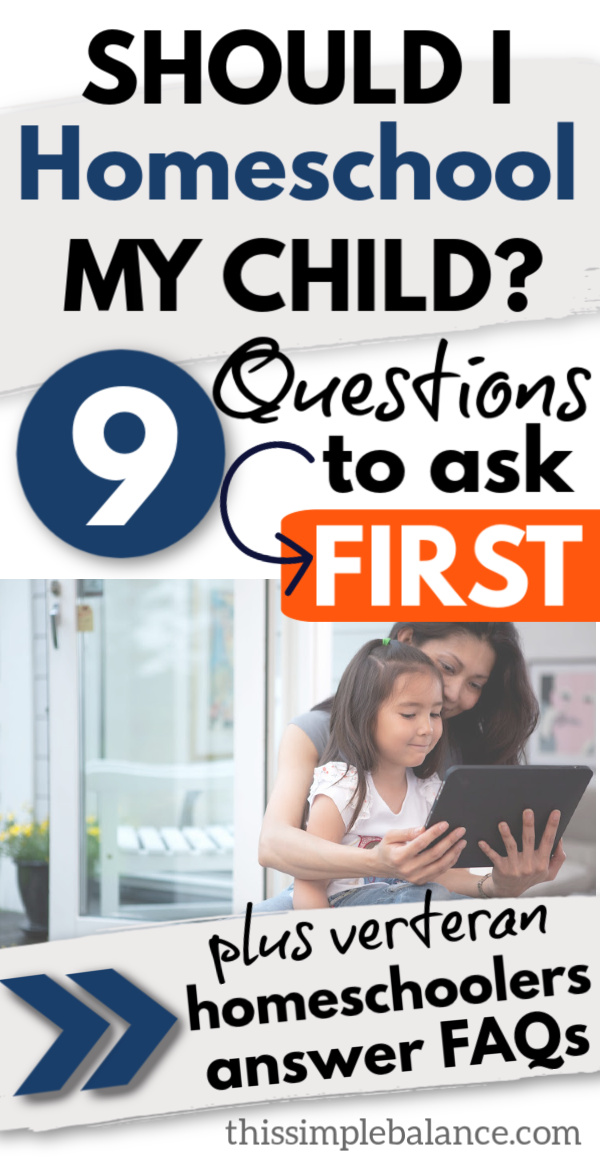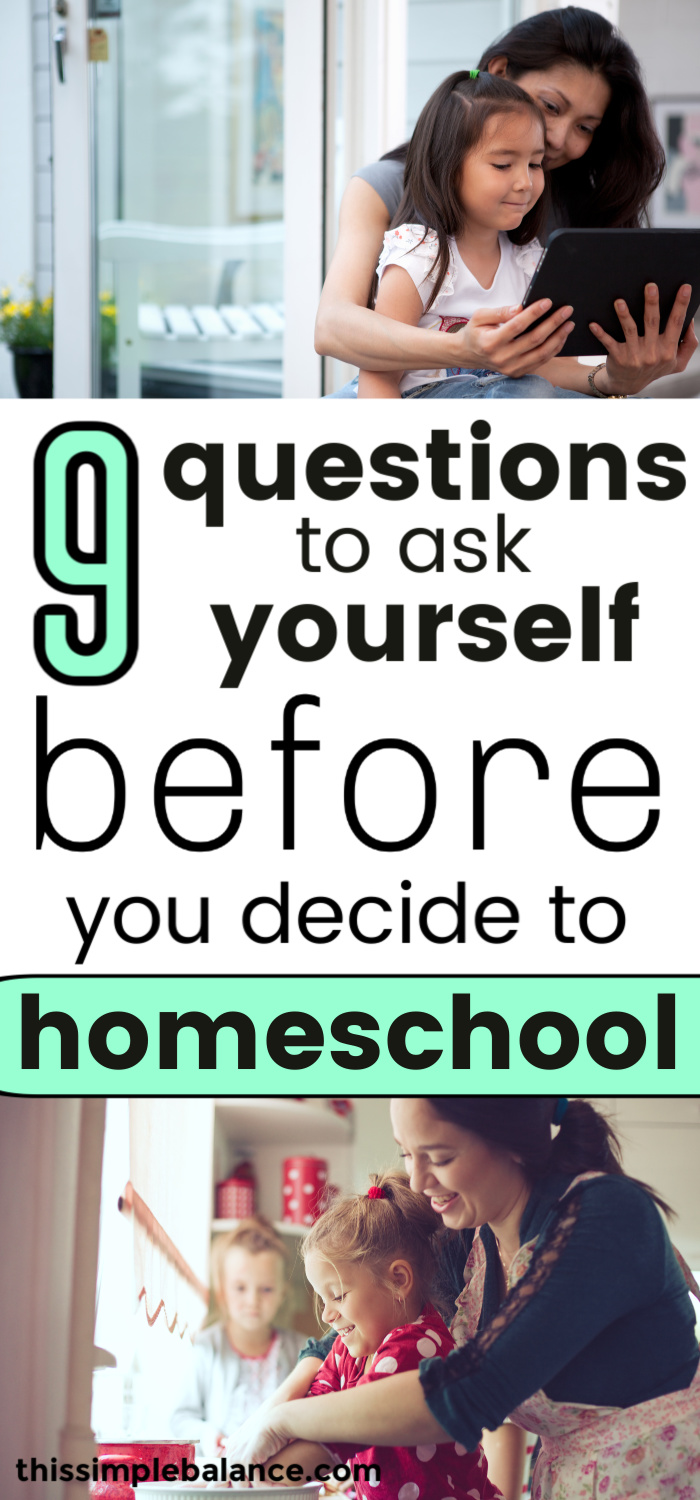Inside: Wondering, “Should I homeschool my child?” Use these 9 questions to guide your decision-making process, plus get answers to commonly asked questions from veteran homeschoolers.
I will never forget the day I decided to homeschool. I’d been going back and forth for months, wanting to homeschool but so incredibly unsure that I was actually capable of homeschooling my child.
I was so uncertain that we actually put down a deposit for our oldest to attend a local private school. A non-refundable deposit.
Still, I couldn’t get homeschooling off my mind.
But that very week, I got a homeschool catalogue in the mail. I couldn’t shake the feeling that I should homeschool.
I turned to my husband and asked him, “Do you think I can do this?”
He said, “Yes.”
His faith in me was all I needed. We told the school my daughter wasn’t coming, and so our homeschool journey began.

Are You Wondering, “Should I Homeschool My Child?” Here’s What You Need to Know
THIS POST PROBABLY CONTAINS AFFILIATE LINKS. AS AN AMAZON ASSOCIATE, I EARN FROM QUALIFYING PURCHASES. YOU CAN READ OUR FULL DISCLOSURE POLICY HERE.
Today, I love our homeschool lifestyle. After five years, I can’t imagine life any other way.
But I wasn’t always so confident. That’s pretty new.
There have been days over the past five years when I seriously considered sending my kids to school, when I thought I was ruining my kids’ futures, when I doubted my relaxed homeschool approach.
It’s taken a lot of reading, a lot of rearranging my thinking about parenting and family life and human nature and education to be where I am today.
The confidence I have now was the result of a five-year process.
If you’re wondering, “Should I homeschool my child?”, you need to know that even if you do decide to homeschool, you might question that decision A LOT of times along the way.
It may take weeks or months or years to be 100% confident that it’s the right decision for your family. While some families will commit to homeschooling indefinitely – until something unexpected arises that pushes a change – others take it one year at a time.
Homeschooling is the road less traveled, swimming against the current, going against the grain.
Even though homeschooling has grown in popularity over the past decade, it is still FAR from a mainstream choice.
It’s a choice you’ll need to fight for, to defend to family and friends, to reassure even yourself that it’s the right choice for your kids, sometimes multiple times a day.
A few years ago, I was pretty zealous – I thought everyone should homeschool.
Now I know better.
Homeschooling is not the best choice for everyone. So how do you know if you should homeschool?
Here are nine questions to consider before you making a decision to homeschool.

9 Questions to Ask Before You Decide to Homeschool
1. Do you want to homeschool?
That seems like a silly question at first. Why would even be considering homeschooling if you didn’t want to homeschool?
But I’ve met a lot of parents who don’t really want to homeschool, yet they are seriously considering it.
Maybe your partner wants you to homeschool.
Maybe your child is being bullied and is asking – no, begging – you to homeschool him.
Maybe your mom is pushing homeschooling, or your best friend homeschools and gushes about how much she loves it all.the.time.
Maybe your child is gifted and is bored out of her mind, but putting her ahead two grades seems like a recipe for disaster socially. Homeschooling feels like the only option for her to thrive academically.
Maybe you just feel like you should.
Those can all be valid reasons to consider homeschooling, but at the end of the day, if YOU are the one who will be the parent primarily responsible for homeschooling, you need to have at least some desire to homeschool.
For most parents, homeschooling out of obligation isn’t sustainable long-term.
2. How will homeschooling affect you financially?
It’s no secret that homeschooling often takes one parent out of the work force, although it IS possible to homeschool and work full-time.
Your first year or two of homeschooling can be stressful. You’re deschooling, getting rid of school mindsets and ideas, figuring out your homeschool style, adjusting to being with your kids day in and day out.
That is a LOT.
Add the stress of trying to live paycheck to paycheck, and you have a lot of stress, which is not healthy. So much of homeschool success depends on YOU, the primary homeschool parent, being able to take care of yourself and stay healthy physically, mentally and emotionally.
I’ve tried to homeschool and live super frugally. It can be done…for a year or two or maybe even three.
Eventually, extreme frugality with kids while homeschooling can lead to burnout, which is why I strongly recommend that you take a long look at your finances before you make the decision to homeschool.
Can you realistically make your budget work long-term without a second income?
Will one income be extremely stressful for your family?
Depending on the answer to those questions, I strongly recommend finding some kind of side hustle or work at home job you can do in 10-15 hours a week while you homeschool (you CAN work from home and homeschool).
There are so many flexible work options in the world today. You can definitely find something that fits your personality, skill set and lifestyle.
Related: 9 Flexible Work-at-Home Jobs Homeschool Moms
3. Do you enjoy being with your kids all day, every day?
I promise – I’m not judging you at all when I ask this question. But an honest answer is pretty crucial if you’re asking, “Should I homeschool my child?”.
My husband is an extreme introvert and an Enneagram 5. He constantly feels like he is “running low on battery” and needs to recharge. He can handle a bit of time with all five kids, but thrives with limited amounts of intentional one on one time.
Could my husband be the primary homeschooling parent? HECK NO.
If anything happened to me, off to school they would probably go.
- Are you an extreme introvert?
- A highly sensitive person?
- A highly driven person who needs full-time work to be your best self?
Those obstacles can be overcome…but you have to WANT to overcome them. You need to have a passion and strong reasons for homeschooling if being with your kids day in and day out drains you.
Or perhaps a university model school would be a better fit, where you send your kids to “school” 2-3 days a week and homeschool 2 days a week.
To be honest, I am an introvert myself, and being with my kids all day every day can be exhausting. We are moving closer to family so that I can hopefully get a couple hours off once a week or so.
If you’re not sure how you feel about being with your kids all day, you might come to love it. If you are pulling them out of school, you may need time to adjust.
Ultimately, if you’ve been thinking for years, “When on earth can my kids be old enough to start school already?” or you can’t wait to send your kids back to school after summer break, homeschooling may not be the best choice for you.
Related: 6 Survival Tips for the Introverted Homeschool Mom
4. Are you prepared for severely limited free time?
For context, I do not have family living nearby, and a pretty weak support system otherwise. I’d rather not spend babysitting money, so I can get free time. You can choose differently.
As a homeschool mom of 5, I have to fit my work into the margins, the “fringe hours”.
I rarely attend doctor appointments without at least one child in tow. And yes, even OB/GYN appointments have been attended with kids hanging out behind the curtain while my doctor does what she needs to do.
Figuring out when I can go get a haircut or even do a random errand without kids is a challenge.
I am constantly prioritizing how to use my spare time and my husband’s time watching the kids, evaluating which things I want to do are really worth it.
Is that haircut really worth it? What about my hour alone reading at Barnes & Nobles? Hanging out with mom friends sans kids?
I’m always juggling. I don’t get to do everything I would do if I wasn’t homeschooling.
For me, it’s worth it. I believe in what I’m doing, and the trade-offs are worth it to me.
That doesn’t mean I don’t sometimes envy school moms’ and their hours of free time to do what they want without interruption or kids tagging along.
Determine your tolerance for limited free time before signing up to homeschool. Complaining about it at home will negatively affect your kids and your family as a whole.
The last thing you want is for your kids to feel like they are a burden because of your choice to homeschool.
5. Do you love learning, and do you know how to find answers to questions you don’t know the answer to?
Some states require a college degree and many require at least a high school diploma. Other states have subjects you are required to teach and total school hour requirements to fulfill, although how you teach them and fill those school hours are often left up to you, the homeschool parent.
But those things don’t really matter all that much in the success or failure of your homeschool.
You can have all the degrees in the world, and your kids can do a gazillion worksheets, but if you don’t love learning, and if your kids can’t SEE your love of learning, homeschooling may not be the best choice for you.
One of my top goals for my kids is to impart a LOVE of learning and to teach them HOW to learn – how to get the information they need and don’t have.
That was how I learned how to start a blog three years ago, long after my degrees were completed. I had a passion for making money from home, and I figured out how to get the knowledge I needed to do just that.
Sometimes I took mini courses, sometimes I went to Google or Youtube, and other times I took my questions to people who had been blogging longer than I had and were willing to answer my questions (sometimes, that took a few tries).
I tried a lot of things, made a lot of mistakes, and tried again.
My passion fueled my perseverance. I figured out how to make a living do this thing, and I’m still learning.
I pieced together my blogging education, and that’s quite honestly what homeschooling looks like for us, and what I see it looking like years down the road.
I share my own passions with my kids, create a home environment that supports learning, and observe their own passions as they start to emerge. Then I support them and get them the tools them need to pursue that passion.
I continuously model a love of learning. If I have a question, I ask it out loud and go get the answers with my kids at my side. I do my best to answer their questions right away.
If you are comfortable modeling a love of learning and how to learn in front of your kids, you will probably love homeschooling.
6. How do you handle criticism?
Homeschooling is NOT the mainstream parenting choice. You will almost definitely face criticism from someone during your homeschool journey.
Unfortunately, that criticism often comes from those closest to you – friends and family.
Other times, the criticism comes from people you don’t know, but are supposed “experts”, whether that be in parenting or education.
You read an article one day saying you are abusing your kids because you choose to homeschool. A Facebook post the next that cites negative outcomes of homeschoolers.
If you are going to homeschool, you need to assess your ability to deal with that criticism. You need to have at least a small degree of confidence in your choice to homeschool, or every wave of criticism will knock you down.
You need to be able to tune out the voices that don’t matter (that random Facebook acquaintance, or supposed expert) and find confidence and courage to handle the negative voices that do matter to you.
Those voices can come in many forms…
- The friend whose kids go to public school, and who seems to think your choice to homeschool is an attack on anyone who chooses different.
- The parents who sent YOU to public school and perceive your choice to homeschool as an attack on the parenting choices they made for you.
- The in-laws who are openly against homeschooling and take every possible opportunity to quiz your kids (often behind your back) and make sure they are getting a “proper education”.
Much of your homeschooling success will be in your ability to shake off the need for approval and find the support you need elsewhere – homeschool groups, veteran homeschool mentors, books written by homeschool parents, supportive experts (Peter Gray is my favorite).
If criticism rocks you to your core, you’ll need to actively prepare for that before, or as you homeschool.
7. Is your spouse/your child’s other parent supportive?
You can definitely handle criticism and lack of support from just about everyone else – except the other parent of your child.
I say other parent because we live in a world where divorce abounds. You could be making the decision to homeschool with your child’s parent who is married to you, or who is divorced from you and living in another house, sharing custody with you.
If that person is against homeschooling, you do need to respect his/her opinion. But don’t give up!
As the parent who is wanting to homeschool, you need to be willing to do a LOT of reading and research yourself and be prepared to have a LOT of conversations.
You need to be able to talk about the benefits of homeschooling and why you want to homeschool in a coherent, logical and calm fashion. Condescension and stammering arguments will get you nowhere.
Ultimately, if the person co-parenting with you isn’t on board, I would think twice about homeschooling. And if they are reluctant or indifferent, make sure you have at least one other supportive person in your life.
You need a cheerleader, someone to vent to on the bad days and to talk you back into it when you want to give up.
8. Are you flexible and willing to figure things out as you go along?
My homeschool looks very little like it did when I first started five years ago.
It took me forever to deschool – traditional school mindsets are hard to shake! We have gradually, with a lot of reading and trial and error on my part, inched toward where we are today.
Your homeschool will change over time. How can it not?
Children will probably be added to the family. Kids grow and change rapidly. Life circumstances change.
You will be exposed to new ideas and naturally want to try new things. You’ll realize that what you thought was the most perfect homeschool method ever in a book works out horribly in your real life homeschool (ask me how I know).
With time, you will figure out your children’s learning styles, what homeschool style(s) resonates with you, and what rhythms work best for your family as a whole. You’ll piece together your best homeschool life.
But it will take time, and a willingness to let go of what isn’t working and try something new.
They say, “The only constant is change.” If you are willing to learn, grow and change, you’ll be just fine.
9. Why do you want to homeschool?
This may be the single most important question you answer.
Why? Because your why is what will keep you going on the low days, the days when you think you’re crazy for choosing this whole homeschool thing, when you are seriously tempted to register your kids for school ASAP.
You need a strong why. The more reasons you have, the better.
And once you know, write them down.
Hang it on your fridge, or put it somewhere you’ll see it frequently. Should you decide to homeschool, you’ll need it more than once your first year – trust me.

Veteran Homeschool Bloggers Answer FAQs for Parents Wondering If They Should Homeschool
I asked several other bloggers to answer questions they’ve had from readers regarding homeschooling. These are some of the things that make parents hesitate to homeschool.
1. What if I am considering homeschooling a high school student for the first time?
Betsey from BJ’s Homeschool offers insight on parents considering start to homeschool during the high school years.
Homeschooling can start any time. Of course many families start earlier, but that is just due to their preference.
If your teen is struggling and/or not getting their needs met in public school, I encourage you to consider the possibility of going the homeschooling route.
With so many advances in the internet over the last few years, there are literally hundreds, actually probably 1,000’s of good resources out there for homeschooling high school. There are lots of companies that offer online courses, book based courses, online live, interactive courses, and others that offer specific courses directed at different learning issues, such as dyslexia.
You do not have to be proficient in the high school core subjects to homeschool your teen either.
With so many great resources out there, you can pick and choose the ones that are a good fit for your teen. Leaving you to manage your teen’s homeschooling, not directly teaching hard high school subjects.
But what about college?
Did you know that there are now colleges who actually seek out homeschooled applicants?
As a homeschooled graduate, your teen would earn an official homeschool diploma, and that is accepted at colleges all around the country.
My daughter got into all of the colleges on her list, with her homeschool transcript. For more guidance on applying to college and helping your teen prepare for that, I invite you to check out College Prep for Homeschoolers.
If your high schooler is struggling in public school, homeschooling might be just the thing to help them succeed. Homeschooling offers the flexibility and choices in curriculum and resources to help them become all that they were created to be.
2. Am I really qualified to teach my kids?
Amy from Rock Your Homeschool answers the question that gives SO many parents pause when they’re considering, “Should I homeschool?”
You may wonder if you have what it takes to homeschool your kids. Little nagging doubts like, “Am I smart enough?” or “I barely finished high school. How can I teach science or algebra?”
Before you let those self-doubts turn into overwhelm, remember that you were your child’s first teacher. You know your child better than anyone else. With your collective experiences and interactions with your child, you have a built-in toolbox of known interests and motivators to use at your disposal.
You don’t need to have an education degree or fancy certificate. Just make sure you meet your state’s requirements to be a home educator. HSLDA shares these guidelines for you to check.
And you don’t need to know it all. If you’re concerned about a particular subject area, outsource it!
Homeschoolers are fortunate to have a variety of quality options, like co-ops and online classes, to quell any fears of inadequacy.
Remember, you don’t have to do it alone. Tap your community resources, like local libraries and museums. Join forums and Facebook groups with like-minded homeschoolers who boost each other as you learn and grow together.
And don’t forget that you always have Google to help you find whatever information you need at any hour of the day 😉
You already have the most important thing to qualify you as a teacher of your kids: love. Build on that foundation and you’ll be off to a solid start!
If you do decide to homeschool, remember that you aren’t making a decision for life. You can take it one year at a time, one child at time.
3. What if I’m not patient enough to homeschool?
Heather from Wonderschooling addresses a common myth – that you need to be the most patient parent on earth to homeschool!
Homeschooling is dramatically different than completing homework assignments for another authority figure. There’s much more room for negotiation, flexibility, and choosing a curriculum that works for your family.
Kids don’t come home exhausted and stressed from a full day of conforming to others’ expectations.
Instead, learning at home has its basis in relationship and connection. It’s based on seeing your child, meeting her where she is, and working through it together.
You’re allowed to have rough days, and your child is, too.
There will be times that both of you (or all of you) lose it. But there are no arbitrary, hard and fast deadlines, and if your kid needs a snack break, no one is stopping you from having one.
If you need to walk out of the room for a few minutes or even pack up the math book and save it for another day, you can do that.
Yes, spending the day with your kids can be tiring, stressful, and draining. But you have the freedom to build in rhythms and quiet times to recharge.
For me, the absolute best part of homeschooling is that I don’t have to patiently wait for that bus to come. While the other parents are pacing at the bus stop, I’m cuddled up with my kids, reading a book, or off on another adventure.
Related: 9 Things You Don’t Need to Homeschool (& The One Thing You Absolutely Do)
4. Can you work and homeschool?
Jen from Practical by Default busts the common myth that you can’t work outside the home and homeschool (she’s been doing it for years!).
The simple answer is yes; you can work and homeschool.
But working and homeschooling may not look like what you think it should. That is because a working mom takes full advantage of the flexibility of homeschooling.
Taking charge of your child’s education means understanding that your kids are always learning. Homeschooling doesn’t take place between 9 am – 3 pm, Monday – Friday.
Instead, you can teach before work, after dinner, on the weekends and holidays. You can cash in on those deep dives into hands-on projects and incorporate life skills into your routine.
You can see some examples of what this might look like in action HERE.
The hardest part of balance working and homeschooling is figuring out how to fit all the pieces of your unique situation into one life.
As a working mom who has been homeschooling for over 13 years, I highly recommend not doing this alone.
I know how it feels to be alone in this journey. To be surrounded by others who don’t really get it.
If you are looking for a super positive, supportive, and online group working homeschool moms out there, check out my online community. It’s the perfect place to get feedback, make friendships, and ask questions. You can join us right here!
They all balance homeschool and working. It can be done: you are not alone!
Related: How to Recover from Homeschool Burnout WITHOUT Sending Your Kids to School
5. Is it really possible to homeschool multiple grades?
Amy from Humility and Doxology was homeschooled herself and is now homeschooling five of her own children.
You’re a mom of more than one student, and you wonder if you have the time to homeschool multiple grades. After all, if each student studies 6 subjects with 6 different workbooks, that will quickly add up to approximately a gazillion things you’re supposed to keep up with!
I’m a mom of 5 (and a 2nd-generation homeschooler), and I’m here to let you in on a secret: School doesn’t have to look like school.
We don’t have to keep the grades separated with their individual textbooks. Instead, we have the flexibility to customize a multi-grade experience.
For example, when we study history, we can all study the same topic without using a grade-specific textbook. We can read books aloud together, go on a fieldtrip, and explore the art and music of the time period. Older children may have additional supplemental assignments, but you will have saved hours of time and energy.
This efficient, multi-grade approach can also work for science, literature, art, and more. If you choose to homeschool, you aren’t bound by grade numbers; you’re free!
Alongside a multi-grade family learning culture, foster independence where applicable. Teach your students how to learn. Instead of hours spent lecturing, step into your role as tutor, facilitator, and mentor.
Not everything you read about on the internet is truly necessary. Rather than trying to fit in all the amazing ideas, choose a few things to do well.
Leave white space in your schedule, and pursue relationships over perfection.
Above all, remember you truly can’t “do it all.” On any given day, something will be overlooked. Be purposeful in your big-picture goals, and remember that homeschool balance occurs over the long-haul.
If you combine grades when possible, nurture independent learners, and abandon perfectionism, you can find time to joyfully homeschool multiple grades.
If You Want to Homeschool Your Child, You Can
Going back to the first question I asked: “Do you want to homeschool your child?”
If you answered yes to that question, I want you to leave this article with the confidence that yes, you CAN. Every other question listed is designed to prepare you, to help you think through potential obstacles that may come up.
But really, any obstacle can be overcome if you want it enough. Unless you live in a country where homeschooling is illegal, you can homeschool your child.
You CAN figure out the finances, learn to enjoy being around your kids all day, and creatively outsource certain subjects if time is a problem.
You CAN set boundaries with the people in your life who are critical of homeschooling, and you can win over a spouse who is reluctant to get on board.
You CAN develop patience and homeschool multiple kids at once.
“Whether you think you can or you think you can’t, you’re usually right.” -Henry Ford
So the question isn’t really, “Should I homeschool my child?”, but “Do I want to homeschool my child?”
If you want to, anything is possible.
Read Next: 24 Benefits of Homeschooling Your Kids (from an unexpected homeschooler)


